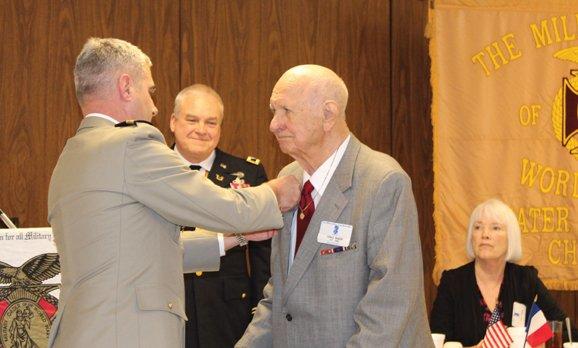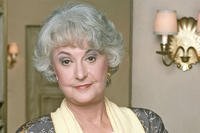Omaha Beach Remembered
"Bullets were flying, tanks were burning and men were bunched up behind the seawall..."
Contributed by Capt. (Ret.) Vincent E. Baker
I was 22 and a newly commissioned second lieutenant when I joined the 58th Armored Field Artillery Battalion in Adderbury, England. After two fairly disastrous practice missions, Operations Fox and Fabius, we headed for the D-Camps in Southern England. There, we attended briefings and studied maps and photos of the beaches and the coast of France. We were told that the Air Force would bomb the beaches and the Navy warships would shell the German bunkers before we landed, but our CO, Lt. Col. Bernard W. McQuade, was skeptical as to whether they could actually knock out the Germans' machine-gun nests. Gen. Omar Bradley attended our final officers' meeting. He arrived at 5 a.m. in a black La Salle limousine to give up a pep talk. The 58th had been in North Africa and Sicily, so he was well acquainted with them. We were attached to the 116th Regiment of the 29th Infantry Division. When Bradley heard the 58th was supporting them, he turned to Gen. Charles Gerhardt, the CO of the 29th, and said, "You've got the best damned artillery the United States Army has to offer."
On June 1, we loaded onto the ships that would take us across the English Channel. I was on LCT-29 (a Landing Craft, Tank), and my assignment was to lead some of our artillery pieces off the craft and onto the beach. We spent the time waterproofing our equipment (I put my watch in a condom), trying to sleep or read, and praying. Everyone wore gas-impregnated clothing. We headed to France in the early morning hours of June 4, but the weather was so bad that we turned around and headed back to the harbor. I'd taken some seasick pills but with Col. McQuade's repeated warnings about the German machine-gun nests uppermost in my mind, I had decided not to eat anything in case I was gut shot. On June 5, we pulled out of the harbor again. H-Hour was at 0630 hours. The 58th's guns were scheduled to land at H+90 minutes. All night on our radios we could hear Axis Sally saying, "Invasion calling." She kept saying it over and over, drawing out those two words in an eerie, high-pitched voice.
Around 0700, I read letters from Gen. Eisenhower and President Roosevelt to the men on my LCT. We were supposed to land on Dog White. Later we learned that the current had pulled us off course, and we wound up landing on Easy Red. Nothing went as planned. Our Navy skipper had gotten the hell shot out of him during the invasion of Italy, and he wanted to dump us and get out of there. He started letting the ramp down prematurely, which exposed us to the Germans' machine-gun fire. I didn't have long to worry about it, though. One minute I was crouched behind the LCT's lowering ramp, rifle in one hand and lead rope in the other. The next minute I was hurtling through the air sans rifle and rope. We'd hit an underwater mine. It had blown the ramp off and sent me flying. I felt weightless, which seemed impossible given my boots and heavy equipment. When I landed in front of the crippled LCT, it occurred to me that I was dead meat if the current pulled me under and the propellers caught me up. My clothing inflated, keeping me afloat, and I could hear bullets hitting the side of the craft and the men screaming for help. "Need a hand?" someone hollered at me. I looked up and saw one of the Navy crewmen looking down at me over the side of the beached LCT. The sailor threw me a line and pulled me aboard. Except for the two of us, the craft was deserted.
The water was knee-deep. None of our self-propelled guns had made it off the craft. The sailor offered me an almost empty bottle of bourbon. I grabbed it and took a swig. When I tried to hand the bottle back, he shook his head and said, "You finish it. I've had plenty." I finished the whiskey, jumped off the landing craft and started wading to shore. The beach was a mess. Bullets were flying, tanks were burning and men were bunched up behind the seawall. I took shelter in a shell crater, trying to get my bearings. I had no idea where I was or where the rest of the 58th was. But I knew if I stayed there I'd be killed, so I took off running toward the seawall. Behind me was this tremendous roar that damned near broke my eardrums. I finally looked back and saw two destroyers pulled broadside to the beach and blasting away at the bluffs.
I still couldn't find anyone from the 58th, but I did see a soldier kneeling near the exit road. I worked my way over and tapped him on the shoulder, yelling, "Hey, do you know where--" He keeled over, dead from a bullet wound in the middle of his forehead. I grabbed his rifle and started working my way up the exit road. I wound up spending the night with a group of other men who had also been separated from their outfits. We didn't get much sleep because of the sniper fire. One of the guys had some cans of soup with fuses in them. We lit the fuses and heated the soup. Mine was split pea, not my favorite, but I was so hungry it tasted like ambrosia.
When I rejoined the 58th the next morning, I learned that Col. McQuade had been killed by machine-gun fire. That really tore me up because he was one hell of a commanding officer. I was sent out to one of the hospital ships to look for our missing men. Bodies were stacked like cordwood on the beach. The bowels of the hospital ship were crowded with the wounded and dying. I saw one doctor standing in the doorway of a stateroom, which was being used as an operating room. The floor was covered with blood, as were his clothes. Back on the beach, I found two German wooden bullets, one red and one black, I put them in my pocket and carried them with me through the rest of the war.
I fought as a forward observer through five major campaigns, was wounded five times, and received two Bronze Stars with the V device. The decorations didn't mean much to me but they had some practical worth because they meant five points, each one, toward going home. And going home meant just about everything. After the war, I took the battalion colors to Col. McQuade's wife. She lived in Brooklyn, NY, with their two children. It was a sad day.













